How to Save the Climate
Air Date: Week of May 13, 2022
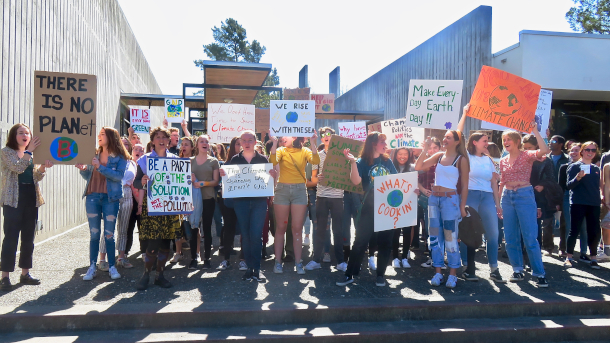
Youth activists participating in a climate protest in Santa Rosa, California. (Photo: fabola, Wikimedia Commons, CC BY-SA 2.0)
The Earth is hurtling toward climate disaster as evidenced by many scientific studies, including the latest results from the UN’s Intergovernmental Panel on Climate Change. Yet the world continues to rely heavily on fossil fuels and drag its heels on transitioning to clean energy. Harvard University Professor of the History of Science Naomi Oreskes joins Host Steve Curwood to note climate change science is unequivocal and why the paths to solving the climate crisis are political and social.
Transcript
CURWOOD: There is now a steady drumbeat of increasing climate peril. Researchers at the UK’s Met Office have just reported there’s a 50-50 chance that sometime in the next four years there will be a year when the average mean global near-surface temperature will exceed 1.5 degrees Celsius above pre-industrial levels. A brief blip at that level does not spell immediate disaster, scientists say, but if it becomes a long-term trend we will be in deep trouble, which is why staying below a 1.5 degree increase is the target of the Paris Climate Agreement. The Met Office report comes on the heels of dire warnings last month from the UN’s Intergovernmental Panel on Climate Change. The IPCC says we must act before it is too late to avert a horribly overheated climate, yet emissions keep rising, especially from huge amounts of methane linked to the natural gas industry. We face an existential threat of historic proportions, so we thought we’d call up a historian for some guidance. Naomi Oreskes is a Harvard Professor of the History of Science. Naomi, welcome to Living on Earth.
ORESKES: Thanks, Steve. It's a pleasure to be with you.
CURWOOD: So we thought we'd call you up to ask what's going on? What should we do? Why is it that we are marching in such lockstep towards climate disaster at this point?
ORESKES: Well, in terms of what's going on, I'd say this is a classic good news and bad news story. And most unequivocal statement of the scientific evidence that we have seen to date. My colleagues and I have tracked this for a long time. And one of the things we've noticed is that the IPCC has been very conservative, they've been very cautious. They've tended to understate the threat. The reports were more or less correct. But on the low side, on the conservative side of predicting what would actually happen. This is the first time where I think the scientific community has stated very clearly very accurately, you know, calling the climate spade a spade. So that's the good news. The bad news is how bad the news is, live really wasted 30 years, you know, the IPCC was first gathered in 1988. We have lived through now more than, you know, 30 years of inaction, of disinformation of disingenuous promises. And so now we are at a point of crisis, a lot of climate deniers, the fossil fuel industry, even ordinary people accuse scientists of being alarmist. Well, we have seen that they did not exaggerate the threat, they really called it pretty much correctly, but because we have ignored it now, it really is something to be alarmed at. Now, we are truly facing a climate crisis.
CURWOOD: At what point are we going to act? We've seen this last year, there was the climate summit in Scotland. But about the only thing that was agreed upon there was the ability for Wall Street to trade in carbon emissions, in terms of direct action to help less fortunate countries mobilize in terms of actually getting emissions down, not much has happened.
ORESKES: Well, of course, and we are in a very bad place. To me, the message that we need to get across now is that this is no longer a scientific question. At this point, there's really no science to argue, the IPCC should declare victory, they should close working group one, they should say, we did the job we were asked to do, we were asked to tell you what level of carbon pollution represents, quote, dangerous anthropogenic interference in the climate system, we've given you that answer. And now the onus is on you, the world society, political, business leaders to do something about it. And I think that's really the message that should be front and center now. So we need to shift our attention away from the science, but really focus on the political, social, and economic aspects of this problem. The reason we haven't acted is because of powerful political, economic, and social forces standing in the way deliberately trying to block action. And then just also all the inertia, the normal inertia and status quo bias that we face any time we want to make change.
CURWOOD: We saw President come into office making a lot of noise about doing something on climate. And yet with the war in Ukraine, the same president is saying to the fossil fuel industry drill, baby drill.
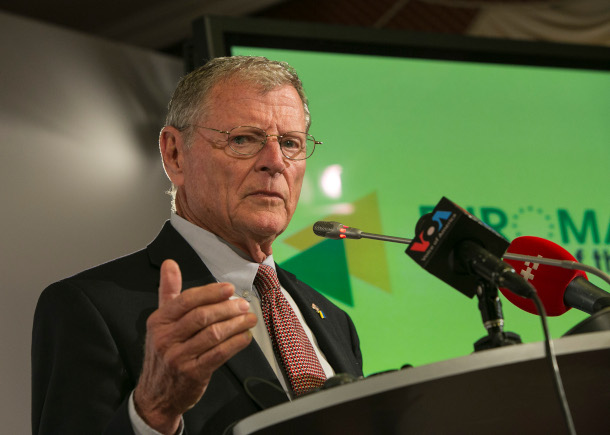
Pictured here is Senator James Inhofe (R-OK) visiting the US Embassy in Ukraine on October 27-28, 2014. Senator Inhofe is notable for holding up a snowball on the Senate floor as evidence that global warming does not exist due to the existence of snow. (Photo: U.S Embassy Kyiv, Ukraine, Wikimedia Commons, Public Domain)
ORESKES: I know and this is really astonishing, because the war should be a reminder to us of how many good reasons there are to act on climate besides just the climate system itself, if we had started the process of transitioning away from fossil fuels to renewable energy, if we'd started that process back in 88, when the IPCC was first gathered, or in 1990, when they first issued their report, or 1992, when the world's nations signed the UN Framework Convention on Climate Change, we could have made that transition by now, all the technologies that we know are available to fix this problem, have been around already for quite a while they've become much cheaper in the last 10 years or so it's kind of a tragedy of historic proportions. I do think historians will be writing about this for years to come.
CURWOOD: And in fact, the president of the United States is looking at midterm elections where the price of gasoline is seen as an indicator of his possible success, the more expensive gasoline is, the lower his odds of keeping control of one or both houses of Congress.
ORESKES: Well, that's right. And this is where I think the messaging of the fossil fuel industry has been far more effective than the messaging of the people who would like to see action on climate. Some of this, I think, is a legacy of effect of having to find this problem as a scientific problem. Scientists are really not the right people to articulate a new political and cultural vision of what it would look like for us to actually be freed from the stranglehold of the fossil fuel industry. But the Democratic Party and scientists and people involved in the climate issue by and large, have not been good at articulating that positive vision of what this looks like how in the long run, we save money by switching to renewables, how in the long run, we save lives, we improve our health, we generate jobs that can't be outsourced. Our political leaders and the people involved in this issue have not done a good job of articulating it. And so the fear mongers can say, oh my god, the price of gas is going up. You know, we have to drill for more oil and gas even though it commits us to a dangerous future and will cost us billions, if not trillions of dollars in damages, which, of course, the American people, the taxpayer, will be picking up the bill for that.
CURWOOD: This year, we have a forecast of 19 named hurricanes and the United States in 3,4,5, serious ones, and only a handful of people driving electric cars who don't care about the price of gasoline going up at the pump.
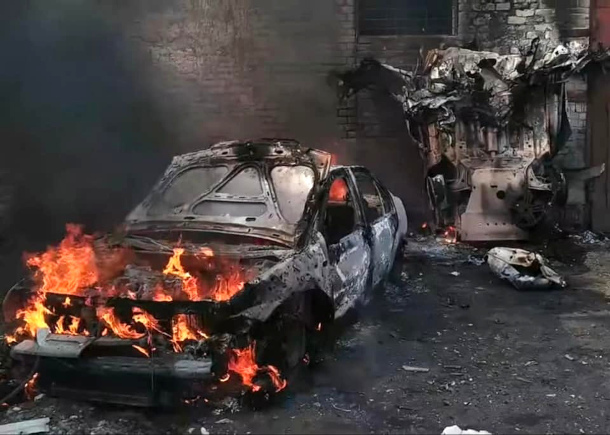
This is a photo of a burning vehicle in Luhansk Oblast in March 2022 during the Russian invasion of Ukraine. The war in Ukraine has led to inflation in the fossil fuel market. But the war has also become a catalyst for renewable energy to be considered a viable alternative as it carries far less security risks than fossil fuels. (Photo: State Emergency Service of Ukraine, CC BY 4.0)
ORESKES: Right. So I mean, it seems to me, one thing the President should be doing is announcing a massive incentive program to switch us all to electric cars, but a really front and center program, tax credits for anyone buying electric car. So first of all, to give incentives for people to get electric cars, which are now really great. I mean, electric cars are good to drive, the forces of darkness, want to cast this as a story of sacrifice. But this is really not about sacrifice. It's about transition. But the alternative is actually better. Electric cars aren't just more efficient and cleaner, they drive better, they're faster, they accelerate faster. And again, that's not a message that's getting out in the way that it needs to I mean, Elon Musk has tried, but he's got his own issues.
CURWOOD: Interestingly enough, Musk did this as something cool for the elite to do not something for the masses to save money on maintenance and fuel expenses, and to not have these fumes in the air that kill 300,000 of us early every year in this country from burning fossil fuels.
ORESKES: Yeah, absolutely. I mean, according to the World Health Organization, 7 million people die every year from air pollution, most of which is driven by fossil fuel combustion, 7 million people. I mean, so this is essentially a global pandemic of death caused by air pollution, mostly caused by fossil fuels. But getting back to the elite versus the everyday again, this is why I think the Ford F 150 truck and the whole Ford fleet, right, Ford has announced there's going to be an electric Mustang, you know, electric trucks, electric sedans. I mean, this is fantastic, right. So I would like to see the President, do a giant press conference with the CEO of Ford Motors to announce this initiative and to say, this is an initiative for all Americans, and we will all benefit. And I just think that could be a really powerful message. And honestly, I don't, I don't know why that's not happening.
CURWOOD: Really. You don't know why?
ORESKES: Well, okay. I guess I do know why. Yeah.
CURWOOD: Yeah. Can you say a little?
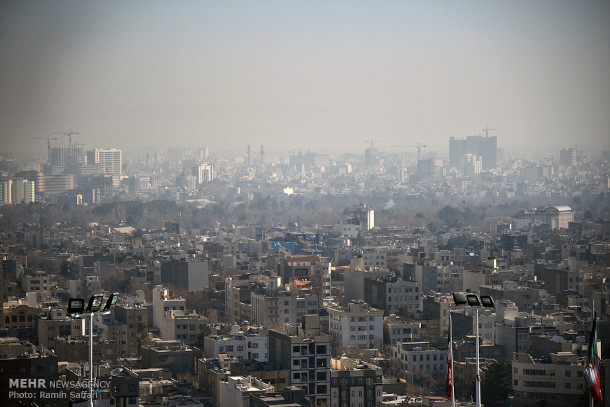
A cloud of air pollution envelopes the city of Mashhad, Iran. Air pollution prematurely kills 7 million people every year according to the World Health Organization. (Photo: رامین صفاری, Wikimedia Commons, CC BY 4.0)
ORESKES: The fossil fuel industry has a stranglehold on Washington, DC. And it's not just the Republicans. I mean, we saw that this year with Joe Manchin's, refusal to play ball. And if you think about it, why are we even in a place where it comes down to one vote, right? There are a lot of people in the Democratic Party who are too close to the fossil fuel industry who are afraid of the fossil fuel industry, the fossil fuel industry does, in fact, target people who stand up against them. But if we don't stand up, then we've given up the fight without a fight. And this is a fight. And it may be dirty, and it may be messy but you know, we have to confront it. Because if we don't, well, then we're looking at 2,3,4 degrees of climate change and massive damage, massive losses.
CURWOOD: Hopefully, the urgency around the use of fossil fuels, because of what's going on in the war in Eastern Europe will abate and people will be able to see that if we weren't so dependent on them that we would have better health and better security. You know, the chief executive of Blackrock, Larry Fink, I don't know, they manage what seven $8 trillion in assets for various people. He said that the war is going to really speed up the greening of, of our economy. But you say that the private side folks may be very helpful. They may be, in fact necessary, but they're not sufficient really to get it done.
ORESKES: Yeah, that is what I think. If we look at history, what we see is that government playing an active role has been essential in all of the major technological transitions of the last century or even more, if we look at the rise of radio or television, or commercial aviation, or rural electrification, what we find is that not one of these was done by the private sector working alone. All of them were done, either by the US government, like rural electrification, or the development of the Internet, or they were done through private public partnership. And so that's why I think that seeing active leadership from the US federal government and state governments, I think that's going to be really important. And I think it's really important for business leaders to reach out to political leaders and vice versa, to figure out what that kind of partnership could look like, in the 21st century.
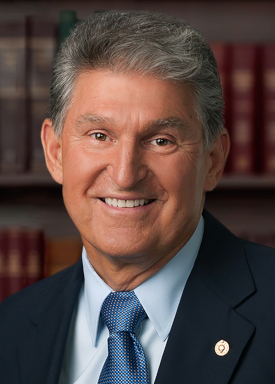
Senator Joe Manchin, Democratic senator for West Virginia is most notable for his direct support of the fossil fuel industry and for being the Democratic senator who has helped to block President Biden’s climate agenda. (Photo: United States Photography Studio, Wikimedia Commons, Public Domain)
CURWOOD: How sufficient Do you think democracy is to this challenge? You and a partner have written a novel a couple of centuries in the future, showing that it was China under a fairly authoritarian regime that best dealt with the climate emergency.
ORESKES: The world's democracies have not been very effective in dealing with this problem. I wouldn't say China has been exactly effective either, but they've taken stronger steps particularly in supporting a powerful solar energy industry. Democracy relies upon the assumption that we have access to good information, and that we can have a free and full exchange of ideas because people are operating in good faith. But if people are lying, and if we're saturated by a sea of disinformation, propaganda, lies, half truths, it makes it incredibly difficult for us as citizens to do our job in a democracy. So I guess another part of this story, a bigger part has to do with disinformation and social media and what steps we need to take to address the spread of disinformation on social media. The myth that many people have the idea that many Americans have that problems are best solved by letting the market do its magic. History refutes it. And so then the question is, why do so many people believe this idea, which is so clearly refuted by experience? And the answer is propaganda. And so we've tracked a 100 year propaganda campaign by American business leaders to promote this free market ideology and to teach us to distrust government. If we don't trust government, then I think we will not actually be able to solve this problem, we really have to address the root causes of people's distrust in government. And some of that, or at least one of the major root causes is propaganda.
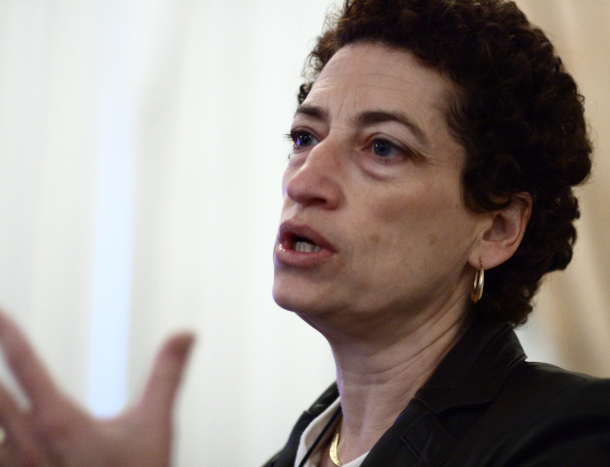
Harvard University Professor of the History of Science Naomi Oreskes speaking at the History of Science Society meeting on November 8, 2008. Prof. Oreskes has studied how the distrust of government is linked to corporate propaganda as well as documented the decades long climate denial campaign launched by the fossil fuel industry. (Photo: Ragesoss, Wikimedia Commons, CC BY-SA 3.0)
CURWOOD: How do we get from here to there?
ORESKES: Well, that's a great question. And again, if you look at history, I think history tells us that bottom up social movements are really important. And especially if you think about civil rights in America, I like to think a lot about Rosa Parks, partly because she was an ordinary person, but also because Rosa Parks didn't actually work alone. But she was actually part of a social movement that had planned that moment. It wasn't spontaneous. But it's really important for us to understand, social change doesn't actually mostly come from individuals working alone, it comes from individuals working together. And bottom up social movements can be very, very powerful, especially then, if they can be linked with articulate and charismatic leaders like Martin Luther King, there's a role for all of us to play, we all need to get involved. And we shouldn't just be sitting in our seats waiting for the Martin Luther King of climate change to emerge, we should all be getting involved to create that bottom up social movement, and to put pressure on our political leaders, because we know they're getting the pressure from the fossil fuel industry, but they're not getting the same kind of counter pressure from ordinary citizens who care about this issue.
CURWOOD: So Professor Oreskes is what gives you hope in this situation?
ORESKES: What gives me hope is the fact that this thing can be solved. There are the technologies, the innovations, the policies that we need all exist, we know what they are, we don't have to invent some new miracle technology. We don't have to invent some new miracle policy. We have the tools at our disposal. We just have to use them.
CURWOOD: Naomi Oreskes is a professor of the history of science at Harvard University. Thanks for taking the time with us today.
ORESKES: You're welcome. It's been a pleasure.
Links
Mother Jones | “A Closer Look at Joe Manchin’s Ties to the Fossil Fuel Industry”
The New York Times | “How Joe Manchin Aided Coal, and Earned Millions”
Nature | “What the War in Ukraine Means for Energy, Climate, and Food”
The New York Times | “Naomi Oreskes, a Lightning Rod in a Changing Climate”
Living on Earth wants to hear from you!
Living on Earth
62 Calef Highway, Suite 212
Lee, NH 03861
Telephone: 617-287-4121
E-mail: comments@loe.org
Newsletter [Click here]
Donate to Living on Earth!
Living on Earth is an independent media program and relies entirely on contributions from listeners and institutions supporting public service. Please donate now to preserve an independent environmental voice.
NewsletterLiving on Earth offers a weekly delivery of the show's rundown to your mailbox. Sign up for our newsletter today!
 Sailors For The Sea: Be the change you want to sea.
Sailors For The Sea: Be the change you want to sea.
 The Grantham Foundation for the Protection of the Environment: Committed to protecting and improving the health of the global environment.
The Grantham Foundation for the Protection of the Environment: Committed to protecting and improving the health of the global environment.
 Contribute to Living on Earth and receive, as our gift to you, an archival print of one of Mark Seth Lender's extraordinary wildlife photographs. Follow the link to see Mark's current collection of photographs.
Contribute to Living on Earth and receive, as our gift to you, an archival print of one of Mark Seth Lender's extraordinary wildlife photographs. Follow the link to see Mark's current collection of photographs.
 Buy a signed copy of Mark Seth Lender's book Smeagull the Seagull & support Living on Earth
Buy a signed copy of Mark Seth Lender's book Smeagull the Seagull & support Living on Earth

